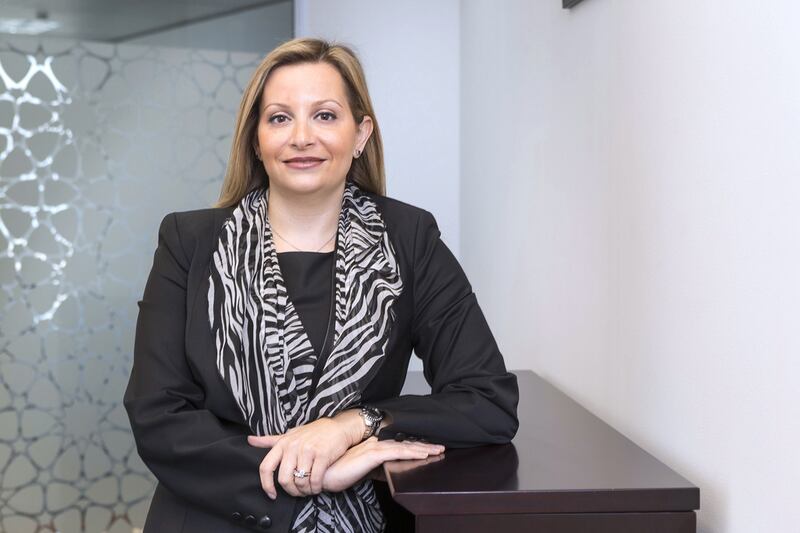An initiative that started in London five years ago, to have more women in senior leadership positions, has launched a new chapter in the GCC.
The 30% Club was founded by Helena Morrissey, a British mother-of-nine and the chief executive of Newton Investment Management, and Baroness Mary Goudie, a member of the UK parliament who is a strong advocate on women’s issues.
They wanted FTSE 100 boards to be composed of at least 30 per cent women, rather than the 12.6 per cent when they launched the club. They have come close to that number with a leap last year in the number of women on FTSE 100 boards to 26.1 per cent.
The new GCC chapter, now one of 10 chapters worldwide, is looking for a similar boost in this region.
“The talent is there, we just need to help this talent rise up to the challenge and grasp the opportunities offered by businesses,” says Jumana Abu-Hannoud, the Jordanian who co-founded the Dubai-based regional chapter in November with Farah Foustok, the Saudi-Lebanese chief executive of Lazard Gulf.
Women in the GCC make up just over half of the students enrolled in higher education, according to the report Women’s Careers in the GCC: The CEO Agenda, released last year by the Pearl Initiative. But only 38 per cent make it to the workforce, with just 17 per cent sitting on corporate boards. A mere 12 per cent of chief executive positions are made up of women.
“It is not a qualification issue; there are many qualified and board-ready women out there,” says Ms Abu-Hannoud. “The question is, how much awareness is there about the value of the role of women on boards, and how much access and exposure is there to the pool of qualified women that are ready to serve on boards?”
__________
Governance in focus
■ Awareness: UAE companies increasingly aware of gains to be had
■ Management: Know your requirements before you set up a board
■ AGMs: When annual meetings become forums for confrontation
■ Virtual AGMs: When the AGM is everything but personal
■ Editor's letter: An issue important to our well-being
■ History: Be good, because investors are watching more closely
■ Poll: Corporate governance in the UAE - have your say
■ Analysis: A good board brings right mix of knowledge and culture
__________
The GCC chapter is a volunteer effort made up of 22 founding chairs, 14 steering committee members and 49 supporting member companies. These include Lazard, Amwal, Dentons, Etihad Airways and Olayan Group.
“We work with member firms to create a better enabling environment for women to compete effectively with their male counterparts, as well as to provide women with opportunities to put themselves out there and truly apply their full potential.”
The chapter has five working groups which aim to develop a pipeline of board-ready women through mentorship programmes, corporate governance best-practices, networking opportunities, research and executive education. For example, Rana Ghandour Salhab is head of the chapter’s research working group, which aims to help businesses improve gender diversity at leadership levels by facilitating knowledge sharing and access to research.
“One of the biggest challenges to women’s access to leadership positions is the continued prevalent masculine corporate culture that is not sufficiently inclusive,” says Ms Salhab from Lebanon. “Male domination in the boardroom is a pure fact.”
She says the 30 per cent figure is not a quota but represents a tipping point. “We do not promote a quota, presenting a quota would only undermine the ability of firms to self-change. It’s about reaching a critical mass whereby businesses are able to sustain the gender balance from a competitive business perspective. We aim to create a cultural shift within member firms, so that recognising women for their potential is not hindered by subconscious biases, or driven by the desire to show an increase in figures only.”
So as the regional communications partner at Deloitte Middle East, and an elected board member for her company, how did Ms Salhab achieve her own career ambitions?
“I made the right choices at critical junctions in my career,” she says. “I did not allow short-term considerations to drive me to make decisions that could adversely impact my career and life in the long term. I looked for a career not a job, a culture not a company, a future not a role.”
So far, the response to the 30% Club has been positive from men as well as women, according to Ms Abu-Hannoud. “Women are very eager to make a change and the male counterparts are very supportive and want to see a change just as much. It’s our strong belief that any fundamental shift or change requires buy-in.”
But she cautions that the gender parity dialogue is not about “preaching to the converted … It works better when businesses take meaningful steps towards cultivating talent and advancing women in the workplace. It’s about creating a mind-shift from this being a women’s only issue to debating a solid case for business growth and sustainability.”
business@thenational.ae
Follow The National's Business section on Twitter





